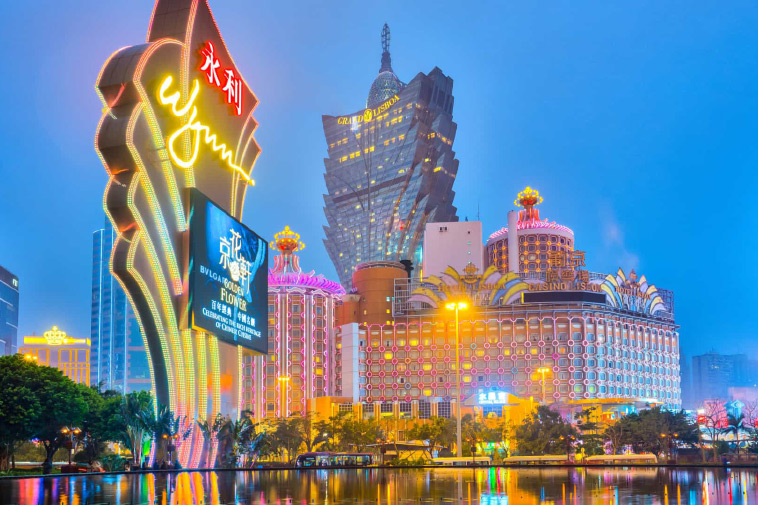For hundreds of years, communities in Southeast Asia have engaged in games of chance. These proto-gamblers enjoyed the roll of the dice and the click of Mahjong tiles, and wherever people gathered in sufficient numbers, some form of gambling was soon a part of the fabric of society.
Today, gambling has become more glamorous. High rollers spend hundreds of thousands—if not millions—of dollars pressing their luck, and more and more internationally owned casino-resorts are being established around Southeast Asia as cities and countries hope to capture some of the revenue that has kept Macau’s economy on the upswing for years.
“The reality is that gaming is very much under-penetrated throughout Asia,” said Grant Goversten, principal and managing director of Union Gaming Group, a boutique investment and securities firm focused on the global casino and integrated resort industry, “so even as new jurisdictions come online all markets are still likely to experience notable growth.”
But can the same be said for nearby property markets? While the establishment or growth of new casinos and integrated resorts could increase opportunities for development of the property that surrounds them, the relationship between profitability of casinos and the profitability of property that springs up in its wake is difficult to track. A locale’s overall economy, governmental regulations and attitudes towards gaming affect the interplay between the two sectors, so the answer to the question could lie in the quintessential real estate mantra: location, location, location.
High stakes in Macau
The most obvious and direct correlation between property and gaming can be drawn in Macau. With 80% of its revenue coming from casinos and affiliated industries, where the gambling industry goes, so goes the rest of the economy—including the property market.
For years, both industries were on a meteoric rise. Revenue in this Special Administrative Region of China has grown by 300% since 2009, and property prices also tripled over the same time period. But with such a narrow base, Macau’s property market and overall economic stability is incredibly vulnerable to external shocks. One such shock came in early in 2014 when Chinese president Xi Jinping launched an aggressive anti-graft and austerity campaign to ferret out corruption and lavish spending. At the same time, there was a crackdown on junket operators and methods some gamblers use to transfer money to and from China. High rollers grew skittish and casino revenue has been dropping steadily since. In October 2014, it fell 23%, the largest year-on-year decline ever recorded. Shares in Macau’s six big casino operators—Sands China, Wynn Macau, Melco Crown, SJM, Galaxy and MGM China—also dropped between 27% and 38% over the course of 2014.
What’s more, Macau’s real estate market seems to be following suit. Transaction volumes for 2014 were at a record low, and Ronald Cheung, chief executive officer of realtor Midland Macau, expects the property market to continue to lose momentum in large part because of declines in the gaming industry and tighter visa restrictions for mainlanders. He believes property prices are likely decrease five percent in 2015.
A drastic drop in money from China may put the breaks on potentially runaway growth, but should the gaming market rebound, the property market could face other difficulties. In July, a country report by the International Monetary Fund cautioned that there was “some evidence of overvaluation and threat of a housing bubble” in Macau, and advised that “should property-price acceleration persist, international experience indicates that tighter housing-related tax policies and additional macro-prudential measures, such as limits on credit exposure to the property sector and lower loan-to-value ratios for purchases of second or more homes, could be used to curtail excessive price growth and contain system risk.”
No impact in Cambodia
In stark contrast to the inextricably linked fortunes of property and casinos in Macau is Cambodia, where the impact of the country’s single integrated resort is negligible or nonexistent.
Cambodia’s flagship gaming company NagaCorp, which is listed on the Hong Kong stock exchange, has grown NagaWorld from a sleepy floating casino on a tributary of the Mekong River into a regional gaming destination, that caters to second-tier high rollers who enjoy the VIP status that they would not receive in Macau.
Today NagaCorp’s integrated resort, NagaWorld, has a stranglehold on the Phnom Penh gambling market. Although there is no shortage of small casinos in Cambodia’s border towns, NagaWorld, is Phnom Penh’s only integrated hotel-casino entertainment complex, and that’s not going to change anytime soon. NagaCorp has a a deal that most other casino operators can only dream of: a 70-year casino license that will run till 2065; an agreement with the Cambodian government that allows the operator to enjoy a 41-year monopoly within a 200km radius of Phnom Penh that expires in 2035; and no taxes on income or gaming revenue, just a fixed fee that last year amounted to 1.5% of total revenue.
Ironically, NagaCorp’s monopoly on the industry will prevent Cambodia from morphing into a large-scale gaming and entertainment hub, so new residential and resort properties are unlikely to cluster around it.
So has NagaCorp provided the impetus for property development in Phnom Penh? The answer is that the activities of the Group have certainly not damaged the up and coming status of Phnom Penh as a property hotspot. There can be no argument that tourism numbers are influenced by the establishment of integrated resorts and gambling establishments and it would seem intuitive that increased tourism numbers drive property development, with punters and their families attracted to holiday accommodation in the area.
“Properties in the vicinity of Naga World are predominantly commercial and institutional in nature and the casino hasn’t really had a quantifiable impact on residential properties in the locality,” said Ross Wheble, country manager at Knight Frank Cambodia. “If anything, it’s the residential market that has driven commercial development in the area, including the recently completed Aeon shopping mall which is Cambodia’s first international standard shopping mall.”
Net neutral in Singapore
Singapore’s first and only two integrated resorts opened in 2010, and today it’s market is second only to Macau. Malaysia’s Genting Group and rival Las Vegas Sands operate two casino and resort complexes in the city-state (at Sentosa and Marina Bay Sands, respectively). The Singapore government recently estimated that casinos contribute 1.5% to 2% of GDP and currently employ 22,400 people at the two resorts, with thousands more employed in services related to gaming.
In spite of this positive effect on the economy, the resorts have had no lasting impact on the surrounding residential market. In 2012, property consultancy firm DTZ issued a report stating that while the integrated resorts initially resulted in an uplift of residential prices in their respective neighbourhoods, the impact was temporary. Prices of non-landed private homes increased after the two resort sites were initially awarded and until approximately a year and a half before their openings, but grew at a slower pace than the rest of the Core Central Region after they opened, resulting in a net neutral effect.
Momentum in Manila
Gambling in Manila has been regulated since 1976, and the Philippine Amusement and Gaming Corporation (PAGCOR), a government entity, opened the first casino in 1977. Even today, most of the city’s 20 or so casinos are owned by PAGCOR under the Casino Filipino brand. The market is set for explosive growth, however, as more integrated resort and gaming complexes are slated to come online in the next few years. Solaire Resort and Casino is the flagship enterprise in the growing entertainment hub of Barangay Don Galo along Manila Bay, and City Of Dreams Manila is scheduled to open within the next 12 months. The third licensee, Manila Bay Resorts, will become operational during 2016.
Manila lags in tourism compared with other cities in the region, with only approximately 1.5 million foreign visitors annually, compared with more than 9 million in Kuala Lumpur, nearly 12 million in Bangkok, 15.6 million in Singapore and 28 million in Macau (14 million overnight visitors). These new developments endeavor to lure visitors from the region generally, as well as capture some of the gaming money from the Chinese market. While the property market in Manila has already seen strong growth, if mega-casinos and entertainment complexes are successful in attracting tourists in increasing numbers, it could open up new opportunities for investors in the resort and hotel residence sector.
Opportunities in Vietnam
Vietnam currently has six casinos operating throughout the country, and like Cambodia, they offer second-tier players the chance to be treated like royalty. More are in the pike, however, as Canada’s Asian Coast Development is developing the Ho Tram Strip, which lies about two hours from Ho Chi Minh City. The Strip is already home to The Grand Ho Tram Strip casino resort, which opened in July 2013, and Asian Coast Development plans to bring a second casino-resort operated by Pinnacle Entertainment Inc., a U.S-based casino owner-operator, as well as a designer golf course to the 2.2-kilometer beachfront, and is part of a USD 4.2 billion tourist development project aimed at attracting foreign visitors.
Be Island is also being scoped out as a location for a high-end integrated resort and tourist destination that would comprise an airport, five-star hotels and casinos. Ly Son and Be islands include about 10 square kilometers of land that sits 15 nautical miles off the coast of Quang Ngai Province.
These new integrated casino-resorts come at a time of unparalleled opportunity for investing in Vietnam. A new law was passed in November 2014 that will open Vietnam’s residential market to foreigners beginning in July 2015, and the fact that multinationals are sinking resources into large-scale developments combined with a market that is largely untapped should yield intriguing prospects.
Conclusion, and a U.S. perspective
Outside of Southeast Asia, another perspective on the relationship between gaming and property exists. Several real estate associations in the United States—as well as state and local governments—have researched the effect of casino openings on nearby residential property and found that housing values decline by anywhere from 2.3% to more than 10% when casinos are introduced to a region. One study by the National Association of Realtors said the impact “unambiguously negative”, citing “congestion and other social costs [that] appear to have a negative impact on home values in the immediate area of a casino.”
There are key differences in the U.S. and Asian market, of course: The regions in question are more likely to be small and mid-sized cities and suburbs, and contain primarily landed residential homes. Still, this research drives home the fact that whatever relationship exists between property prices and gaming in any given market is far from a universal one.
There can be no doubt that there is an enormous appetite for games of chance in South East Asia. A growing Chinese (and indeed pan Asian) middle class with increasing amounts of disposable income has ensured a steady supply of high rollers feeding the profits of gambling operations and buoying the fiscal fortunes of their host nations.
There is no doubt that gambling establishments and integrated resorts can increase employment and therefore potentially provide local investors with the capital to invest in property, as well as increase tourism which could drive occupancy at resort residences. An increase in the numbers of tourists and junkets to a region could help raise its profile and make it more attractive to property investors. At the same time, the population of certain locales could find increases in both human and vehicular traffic unwelcome, and fear that unsavory behavior could flourish around gambling establishments.















